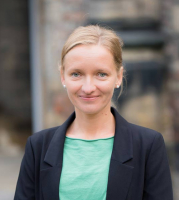adiunkt w Zakładzie Języka Angielskiego i Językoznawstwa Teoretycznego

Konsultacje odbywają się w środy i piątki w godzinach 9:00 - 9:45 za pomocą MS Teams. Studentów proszę o wcześniejszy kontakt pod adresem magdalena.sztencel@ug.edu.pl w celu potwierdzenia spotkania.
Dr Magdalena Sztencel works in the Institute of English and American Studies, where she teaches Semantics and Pragmatics, Syntax, Critical Discourse Analysis and Academic Writing. Her main research so far has focused on the current debate about the semantics-pragmatics distinction, conditionals and modals. She is interested in integrating linguistic, philosophical and psychological perspectives to further an understanding of common-ground effects on the interpretation of utterances, including in intercultural contexts.
Prior to joining the team at the University of Gdańsk, she worked at Newcastle University, Northumbria University and York St John University in the UK. She is a Fellow of the Higher Education Academy (UK) and an ad hoc reviewer for Cambridge University Press, De Gruyter, Routledge and Edinburgh University Press.
Qualifications:
PhD in Linguistics, Newcastle University, UK, 2013
MA in English Philology (TESOL), Uniwersytet Jagielloński, 2004
BA in English Philology, Uniwersytet Pedagogiczny w Krakowie, 2001
Member of the International Association for Teaching Pragmatics (ITAP)
Member of the Slavic Cognitive Linguistics Association (SCLA)
Fellow of the Higher Education Academy
semantics, pragmatics, intercultural pragmatics, critical discourse analysis, argumentation
Sztencel, Magdalena. (2020). A common ground perspective on interactional strategies for global communication in English. In I. Koutny, I. Stria and M. Farris (eds.), The Role of Languages in Intercultural Communication. Wydawnictwo Rys, pp. 221-233. doi.org/10.48226/978-83-66666-28-3
Sztencel, Magdalena. (2018). Semantics, Pragmatics and Meaning Revisited: The Case of Conditionals. Perspectives in Pragmatics, Philosophy & Psychology 17. Dordrecht: Springer. doi.org/10.1007/978-3-319-69116-9
Sztencel, Magdalena & Duffy, Sarah. (2018). Reporting conditionals with modals. In: Capone, A., Garcia-Carpintero, M. and Falzone, A., (eds.), Indirect Reports and Pragmatics in the World Languages, 201-226. Dordrecht: Springer. doi.org/10.1007/978-3-319-78771-8_10
Sztencel, Magdalena (2011). Against referential semantics. In P. Frath et al. (eds.) Res-per-nomen III: La référence, la conscience et le sujet énonciateur, 485-498. Université de Reims Champagne Ardenne: Épure.
Sztencel, Magdalena & Duffy, Sarah. E. (in press). Modals and conditionals in instrumental practical reasoning: the case of Polish. Linguistics Vanguard.
Sztencel, Magdalena. (2020). Intercultural pragmatics in the Global Englishes context: some implications for developing intercultural communicative competence. Beyond Philology 17(3), 7-31. doi.org/10.26881/bp.2020.3.01
Sztencel, Magdalena & Clarke, Leesa. (2018). Deontic commitments in conditional promises and threats: towards an exemplar semantics for conditionals. Language and Cognition 10(3), 435-466. doi:10.1017/langcog.2018.10
Sztencel, Magdalena. (2014). Conditionality in individual minds: an argument for a wholly pragmatic approach to utterance in interpretation. Lingua 152, 81-97. doi.org/10.1016/j.lingua.2014.09.012
Sztencel, Magdalena. (2012). Do we need specifically linguistic semantics? Newcastle Working Papers in Linguistics 18, 73-92.
Sztencel, Magdalena. (2011). From words to concepts. Kwartalnik Neofilologiczny LVIII (3), 375-394.
Sztencel, Magdalena. (2010). Chomskian perfection meets Polish yers. Newcastle Working Papers in Linguistics 16, 184-205.
Sztencel, Magdalena. (2009). Boundaries crossed: the influence of English on Modern Polish. E-pisteme [Online] 2 (1), 3-17.
Magiera, Magdalena. (2004). Niektóre znaczenia should. Zeszyty Naukowe Akademii Polonijnej w Częstochowie 4, 116-131.
2021. Modals as a diagnostic for biconditional versus material interpretations of conditionals. The Semantics and Pragmatics of Conditional Connectives Workshop at 43rd Annual Conference of the German Linguistic Society (DGfS), University of Freiburg, February 23-26, 2021 (with Sarah E. Duffy)
2020. Intercultural pragmatics in the Global Englishes context: some implications for developing intercultural communicative competence. 5th Interlinguistic Symposium, Uniwersytet Adama Mickiewicza w Poznaniu, September 17-18, 2020.
2017. Logic meets social cognition in conditional promises and threats. Invited talk, Katedra Anglistyki Uniwersytetu Pedagogicznego w Krakowie.
2017. Teaching phonetics to visually impaired students. International conference on Accessible Linguistics to Visually Impaired Students (ALVIS), York St John University, UK (with Kate Whisker-Taylor, Nikki Swift, Alice Pennington and Sarah Martin)
2016. Breaking the terms of conditional promises and threats. 6th UK Cognitive Linguistics Conference, Bangor University, UK.
2015. Broken promises and unfair punishments: their significance for the theories of meaning. Invited talk, ShefLing Postgraduate Conference in Linguistics, University of Sheffield, UK.
2015. 'If' in the armchair, 'if' in the lab, 'if' in the wild: methods of investigating word meaning. Invited talk, Languages and Linguistics Colloquium Series, York St John University, UK.
2014. Reconciling truth-based inference with subjective inference?: a view from a multiple-trace theory of memory. Empirical Methods of Linguistics in Philosophy, TU Dortmund University, Germany.
2014. Conditionals in an individual mind: a view from the multiple-trace theory of memory. 5th UK Cognitive Linguistics Conference, Lancaster University, UK.
2012. Do we need specifically linguistic semantics? 4th UK Cognitive Linguistics Conference, Kings College London, UK.
2012. On conventional association of sound and meaning. 4th UK Cognitive Linguistics Conference, Kings College London, UK (with Andrew Feeney).
2011. Against referential semantics. Res per Nomen 3: International Conference on Reference, Consciousness and the Speaking Subject. University of Reims, France.
2011. Words, concepts and the nature of semantics. PhiLang 2011: Second International Conference on Philosophy of Language and Linguistics, Uniwersytet Łódzki.
2011. Syntax and semantics in the Representational Hypothesis. Invited talk, Northumbria Linguistics Seminar Series, Northumbria University, UK (in collaboration with Andrew Feeney).
2009. Yers in Polish – a representational voice in the debate. 4th Postgraduate Conference in Theoretical and Applied Linguistics, Newcastle University, UK.
